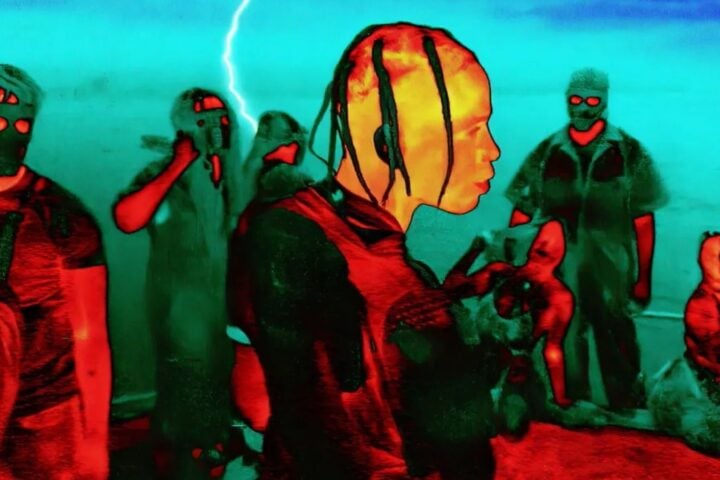On his fourth studio album, Utopia, Travis Scott unleashes a familiar bag of tricks: seemingly endless beat switch-ups, seemingly for pure showmanship’s sake; a who’s-who of guests, ranging here from Dave Chappelle to James Blake; and an eclectic sonic palette courtesy of the biggest producers working today. Of course, the Houston rapper himself serves as the ringleader to the unfurling chaos, with his trademark bleary vocals—usually slathered in an excessive amount of Auto-Tune—zigzagging across each track.
The album operates less as a cohesive body of work and more as a series of show-stopping set pieces, each one seeking to out-do the last. By the time you get to “Telekinesis,” Utopia’s operatic penultimate track, it feels like the album has already reached at least three different climaxes. Simply put, Scott is in the business of engineering spectacles.
Utopia’s sequencing is Scott’s secret weapon, where the first six songs—from the turbulent “Hyena,” which rocks both a Funkadelic and Gentle Giant sample, to the mellower “My Eyes”—constitute his best run of tracks to date. The moody “God’s Country,” which was supposed to be on Kanye West’s Donda, is a psychedelic trip that’s made even more surreal by the inclusion of a haunting looped vocal passage from Polish composer Krzysztof Komeda’s “Lullaby, Part 1.”
Utopia does begin to peter out during its cluttered middle section, where it slowly starts to feel as if Scott has lost the (admittedly minimal) thread within all of the noise. “Meltdown” is basically “Sicko Mode: Part 2,” with a pouty Drake appearance and several superfluous phaser beam effects for good measure, while “Fe!n,” despite its straight-up hallucinatory beat, contains the most dead air of any track here (as well as the worst guest spot in Playboi Carti, who sounds like he’s suffering from bronchitis). But the biggest missed opportunity from this portion of the album is the house-y “Delresto (Echoes),” an exciting exercise in tension-building that never fully develops its compositional ideas beyond ratcheting up its taught energy.
The only other misstep is “K-Pop,” a reggaeton and afrobeat fusion so sterile and lifeless that it sounds like something ChatGPT spat out. The rest of the songs on Utopia, especially the aggressive “Looove” and the breezy “Parasail,” with its harmonious pre-chorus courtesy of Yung Lean, march forward with a similarly unflinching resolve and feel high off their own supply.
“Skitzo,” which includes no less than four beat switch-ups and three key changes, is proof enough that, as a rapper, Scott can keep up with the best of them, but he’s still largely unable to convey anything close to a personality on the mic. When he isn’t resorting to hollow brags, his limited songwriting becomes all too apparent. The most comical line comes in the form of a flimsy flex about Scott’s own ubiquity as an influencer: “Seen the Top 10 pen list, I don’t even know how they could pin this/Knowin’ that I’m the human Pinterest.
Still, complaining about the lyrics on a Travis Scott album is the equivalent to whining about the dialogue in a John Woo film. He seems less concerned with what he’s saying than with the emotion and feeling his music conveys. It’s a bit of a lopsided approach, but few in today’s hip-hop landscape can truly be considered an auteur the way Scott is. While his artistic vision may be a shaky one, there’s no denying that Utopia, bumps and all, is one hell of a ride.
Since 2001, we've brought you uncompromising, candid takes on the world of film, music, television, video games, theater, and more. Independently owned and operated publications like Slant have been hit hard in recent years, but we’re committed to keeping our content free and accessible—meaning no paywalls or fees.
If you like what we do, please consider subscribing to our Patreon or making a donation.




